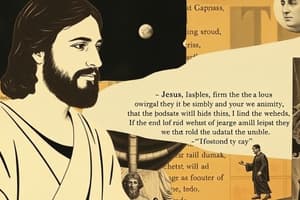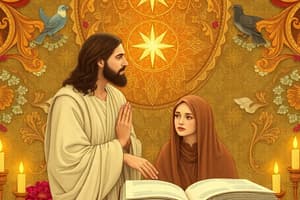Podcast
Questions and Answers
What does the sower parable represent?
What does the sower parable represent?
The sower represents God and the seed is His message.
What does the Mustard Seed Parable teach?
What does the Mustard Seed Parable teach?
- The kingdom will start small but grow large. (correct)
- Everything will remain the same.
- Small acts can have a significant impact. (correct)
- None of the above.
What foundation is important according to The Two Foundations parable?
What foundation is important according to The Two Foundations parable?
It is important to have faith in Jesus.
The Lost Sheep parable states that Jesus will not seek the one lost sheep.
The Lost Sheep parable states that Jesus will not seek the one lost sheep.
What is the main lesson from Weeds amongst the Wheat?
What is the main lesson from Weeds amongst the Wheat?
According to the Judgement of Nations, how should we treat vulnerable people?
According to the Judgement of Nations, how should we treat vulnerable people?
What does a Good Samaritan do?
What does a Good Samaritan do?
What does the Prodigal Son parable convey about God's attitude towards sinners?
What does the Prodigal Son parable convey about God's attitude towards sinners?
What lesson does the Rich Man and Lazarus teach?
What lesson does the Rich Man and Lazarus teach?
Flashcards
Sower Parable Meaning
Sower Parable Meaning
God is the sower, His message is the seed.
Mustard Seed Parable
Mustard Seed Parable
The Kingdom of God starts small but grows greatly.
Two Foundations Parable
Two Foundations Parable
Faith in Jesus Christ is the most important groundwork.
Lost Sheep Parable
Lost Sheep Parable
Signup and view all the flashcards
Weeds Among Wheat
Weeds Among Wheat
Signup and view all the flashcards
Judgment of Nations
Judgment of Nations
Signup and view all the flashcards
Good Samaritan
Good Samaritan
Signup and view all the flashcards
Prodigal Son Parable
Prodigal Son Parable
Signup and view all the flashcards
Rich Man and Lazarus
Rich Man and Lazarus
Signup and view all the flashcards
Study Notes
Sower Parable
- Represents God's act of planting the message of faith, symbolized by seeds.
- Highlights the different responses to God's message based on one's heart condition.
Mustard Seed Parable
- Illustrates the growth of the Kingdom of God, beginning from small beginnings.
- Emphasizes that even minor actions can result in significant outcomes and impact.
The Two Foundations
- Stresses the importance of faith in Jesus as the cornerstone of a strong life foundation.
- Suggests that a solid foundation aids in enduring life's challenges.
The Lost Sheep
- Portrays Jesus' unconditional love and dedication to seeking out those who are lost.
- Highlights the value of each individual, emphasizing that no one is too insignificant to be sought after.
Weeds Amongst the Wheat
- Suggests that appearances can be deceiving; individuals believed to be sinners may possess righteousness.
- Encourages humility and discourages judgment of others, as the true nature of people can be obscured.
Judgement of Nations
- Calls for compassion and love towards marginalized groups, symbolizing the poor and vulnerable.
- Teaches that serving these individuals equates to serving Jesus himself.
Good Samaritan
- Focuses on the importance of helping others regardless of their background or identity.
- Based on the parable where a Samaritan aids a wounded Jewish man, breaking cultural and societal barriers.
Prodigal Son
- Illustrates God's forgiveness and joy upon sinners who repent and return to Him.
- Encapsulates the theme of redemption and unconditional love from a father figure, symbolizing God.
Rich Man and Lazarus
- Reinforces the principle of treating others with kindness and respect, reflecting the Golden Rule.
- Highlights the long-term spiritual consequences of one's actions and treatment of others when facing God.
Studying That Suits You
Use AI to generate personalized quizzes and flashcards to suit your learning preferences.




